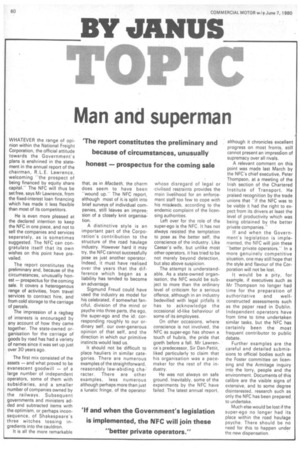Man and superman
Page 62

If you've noticed an error in this article please click here to report it so we can fix it.
'The report constitutes the preliminary and because of circumstances, unusually honest — prospectus for the coming sale
WHATEVER the range of opinion within the National Freight Corporation, the official attitude towards the Government's plans is enshrined in the statement in the annual report of the chairman, R.L.E. Lawrence, welcoming "the prospect of being financed by equity share capital." The NFC will thus be set free, says Mr Lawrence, from the fixed-interest loan financing which has made it less flexible than most of its competitors.
He is even more pleased at the declared intention to keep the NFC in one piece, and not to sell the companies and services separately, as is sometimes suggested. The NFC can congratulate itself that its own wishes on this point have prevailed.
The report constitutes the preliminary and, because of the circumstances, unusually honest — prospectus for the coming sale. It covers a heterogenous range of activities, from travel services to contract hire, and from cold storage to the carriage of parcels.
The impression of a ragbag of interests is encouraged by any account of how they came together. The state-owned organisation for the carriage of goods by road has had a variety of names since it was set up just over 30 years ago.
The first mix consisted of the assets — and what proved to be evanescent goodwill — of a large number of independent operators, some of them with subsidiaries, and a smaller number of companies owned by the railways. Subsequent governments and ministers added and subtracted items with the optimism, or perhaps inconsequence, of Shakespeare's three witches tossing ingredients into the cauldron.
It is all the more remarkable that, as in Macbeth, the charm does seem to have been "wound up." The NFC report, although most of it, is split into brief surveys of individual companies, still leaves an impression of a closely knit organisation.
A distinctive style is an important part of the Corporation's contribution to the structure of the road haulage industry. However hard it may try, the NFC cannot successfully pose as just another operator. Indeed, it must have realised over the years that the difference which began as a liability has tended to become an advantage.
Sigmund Freud could have used the industry as model for his celebrated, if somewhat fanciful, division of the mind or psyche into three parts, the ego, the super-ego and the id: corresponding roughly to our ordinary self, our over-generous opinion of that self, and the direction in which our primitive instincts would lead us.
It should not be difficult to place hauliers in similar categories. There are numerous examples of the straightforward, reasonably law-abiding cha-' racter. There are other examples, less numerous although perhaps more than just a lunatic fringe, of the operator whose disregard of legal or .civilised restraints provides the main livelihood for an enforcement staff too few to cope with his misdeeds, according to the endemic complaint of the licensing authorities.
Left over for the role of the super-ego is the NFC. It has not always resisted the temptation to pose as the better self, the conscience of the industry. Like Caesar's wife, but unlike most other operators, it has tried to be not merely beyond detection, but also above suspicion.
The attempt is understandable. As a state-owned organisation, the NFC would be subject to more than the ordinary level of criticism for a serious offence, although in an industry bedevilled with legal pitfalls it has to acknowledge the occasional id-like behaviour of some of its employees.
On other occasions, where conscience is not involved, the NFC as super-ego has shown a touch of hubris, the pride that goeth before a fall. Mr Lawren-. ce's predecessor, Sir Dan. Pettit, liked particularly to claim that his organisation was a pacemaker for the rest of the industry.
He was not always on safe ground. Inevitably, some of the experiments by the NFC have failed. The latest annual report, although it chronicles excellent progress on most fronts, still cannot present an impresgion of supremacy over all rivals.
A relevant comment on this point was made last March by the NFC's chief executive, Peter Thompson, at a meeting of the Irish section of the Chartered Institute of Transport. He praised recognition by the trade unions that "if the NFC was to be viab!e it had the right to expect from its drivers at least the level of productivity which was being obtained by the better private companies."
If and when the Government's legislation is implemented, the NFC will join these "better private operators." In a more genuinely competitive situation, one may still hope that the style and flavour of the Corporation will not be lost.
It would be a pity, for example, if executives such as Mr Thompson no longer had time for the preparation of
authoritative and wellconstructed assessments such as the paper read in Dublin. Independent operators have from time to time undertaken similar tasks, but the NFC has certainly been the most frequent contributor to public debate.
Further examples are the careful and detailed submissions to official bodies such as the Foster committee on licensing and the Armitage inquiry into the lorry, people and the environment. Documents of this calibre are the visible signs of extensive, and to some degree disinterested, research such as only the NFC has been prepared. to undertake.
Much else would be lost if the super-ego no longer had its place within the road haulage psyche. There should be no need for this to happen under the new dispensation.




















































































































































